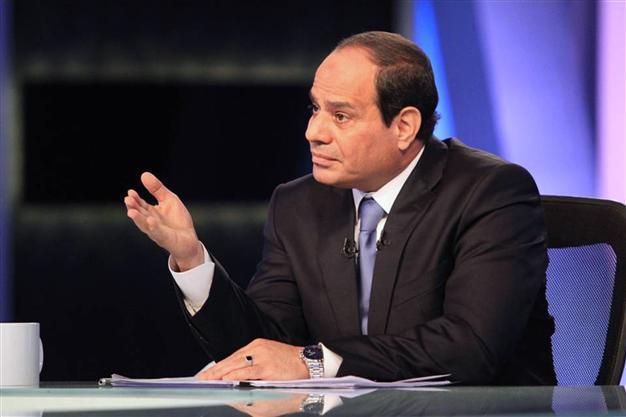Do not push for press freedom: Egypt’s el-Sisi
CAIRO

Presidential candidate and Egypt's former army chief Abdel Fattah al-Sisi talks during a television interview broadcast on CBC and ONTV, in Cairo, May 6, 2014. REUTERS Photo
Egypt’s top presidential candidate, Abdel Fattah el-Sisi, has warned newspaper editors to give officials a chance to do their jobs before exposing corruption in the country.
He also urged them not to press for freedom of speech and other similar rights, adding that full democracy was an “idealistic” goal that could take 25 years to reach.
El-Sisi is seen as the overwhelming favorite to win the May 26-27 election. So far in his campaign he has heavily pushed the message that his priority is to restore stability and to make “leaps” in development by reducing poverty in the country. He has repeatedly said the public must get behind him and stop protesting.
In a four-hour meeting with around 20 editors from Egypt’s main newspapers, parts of which were aired on a private TV network on May 8 and published on newspaper websites, el-Sisi said media freedom should take into account national security. He added that the media should focus on rallying the public behind “the strategic goal” of “preserving the Egyptian state.”
Barking “watch out!” el-Sisi warned editors against “scaring people” with coverage that “creates skepticism or uneasiness in society.”
Speaking about protests, he said: “You write in the newspaper, ‘No voice is louder than freedom of speech!’ What is this? What tourist would come to a country where we have demonstrations like this? You know that there are millions of people and families who cannot earn a living here because of the protests. It is one of the manifestations of instability.”
His comments came as the government continues to crack down on journalists, including three Al-Jazeera English journalists and others, who have been accused of supporting the Muslim Brotherhood.
Most of the newspaper editors who attended the meeting, while reporting the comments, focused their headlines on other parts where el-Sisi spoke about plans to fight corruption and poverty, as well as his readiness to leave power.
El-Sisi also told the editors not to push for press reforms in state institutions, by exposing corruption or other problems, and to give officials time to do their jobs.
“Give officials a chance for, let’s say, four months,” he said. “If you have information or a subject you need to talk about [to officials], it is possible to do so without exposing it.”
Referring to demands for reforms in government bodies, he said people call for the “dismantlement” of institutions as a form of achieving democracy, but “you don’t know that as you work to dismantle, you will find a mirage and that Egypt has been lost.”
He gave the example of coverage of Egypt’s chronic energy crisis. Shortages of fuel at power stations have caused rolling blackouts around the country for months, prompting warnings that they could worsen in the summer months. He said that instead of scaring people about the coming summer, newspapers should interview experts and propose alternatives to the energy crises.
Still, he said he was opposed to previous governments’ lack of transparency, saying authorities must provide information to the people to counter negative reports. “Transparency is one of the basic [foundations] of national security,” he said.
El-Sisi told the editors that Egypt “cannot bear” more uneasiness. “You are making an idealistic demand in a situation that is very painful ... This is democracy? I fear that while we are practicing [democracy], we won’t find a nation,” he said.
“Our problem is that we call up images of Western democracies that have been stable for hundreds of years and drop them into our reality,” he said, adding that it could take “20 or 25 years to reach a stage of complete democracy.”
He said he has spoken to Western officials about foreign funding to non-government organizations and that some of these groups aimed at “toppling the state.”
